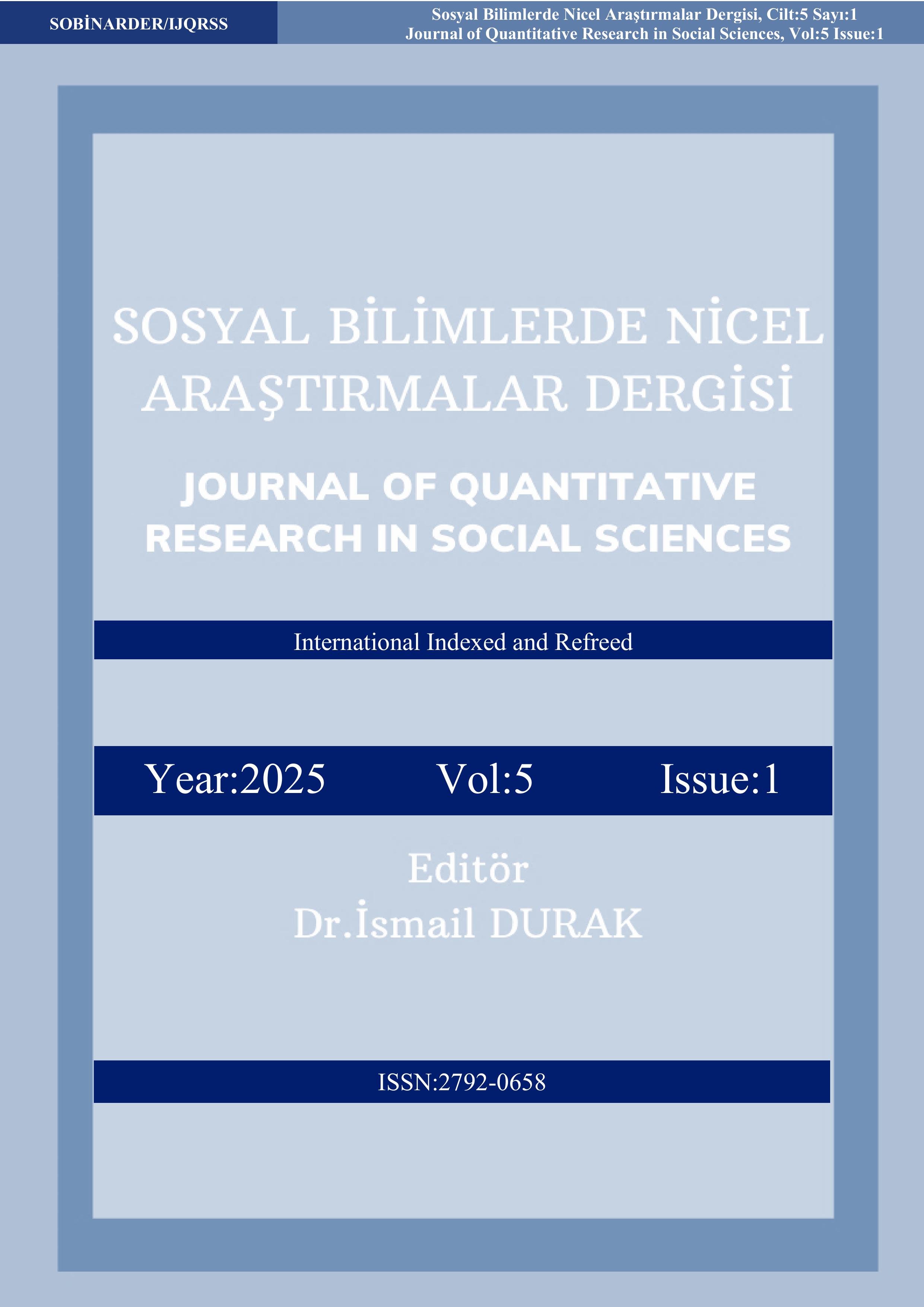The Impact of Health Expenditures on Economic Growth: The Example of Turkish World States
Sаğlık Hаrcаmаlаrının Еkonomik Büyümе Üzеrindеki Еtkisi Türk Dünyası Devletleri Örneği
Keywords:
Economic Growth, Health Expenditures, Turkic World States, SUR ModelAbstract
This study aims to analyze the impact of health expenditures on economic growth in the Turkic World States consisting of Azerbaijan, Kazakhstan, Kyrgyzstan, Uzbekistan, Turkmenistan and Turkey between 2000-2020. Gross domestic product (GDP) per capita was used as the indicator of economic growth; the independent variables were determined as health expenditures and population. In the study, the relationship between the variables was estimated by the Seemingly Unrelated Regression (SUR) method using a panel data set. Cross-sectional dependency and homogeneity tests were performed to test the suitability of the panel data structure before the analysis. According to the findings, there is a positive and significant relationship between health expenditures and economic growth. It was also observed that population growth had positive effects on economic growth. However, the level of these effects varies among countries. The research results show that, especially in countries such as Turkey and Kazakhstan, economic growth encourages health investments, and these investments support economic development by increasing the quality and accessibility of health services. On the other hand, in some countries such as Turkmenistan, although health expenditures are high, economic growth remains limited, which affects the resources. It indicates efficiency problems in its use.
References
Akar, S. (2014). Türkiye’de sağlık harcamaları, sağlık harcamalarının nisbi fiyatı ve ekonomik büyüme arasındaki ilişkinin incelenmesi. Manisa Celal Bayar Üniversitesi Yönetim ve Ekonomi Dergisi, 21(1), 311–322.
Akıncı, A., & Tuncer, G. (2016). Türkiye’de sağlık harcamaları ve ekonomik büyüme arasındaki ilişki. Sayıştay Dergisi, 102, 47–61.
Atılgan, E., Ertuğrul, H. M., Baycan, O. ve Ulucan H. (2024). Health-led growth hypothesis and health financial systems: an econometric sythesis for OECD.Frontiers in Public Health, 12:1437304.
Aydemir, C., & Baylan, S. (2015). Sağlık harcamaları ve ekonomik büyüme ilişkisi: Türkiye üzerine bir uygulama. Dicle Üniversitesi Sosyal Bilimler Enstitüsü Dergisi, (13), 417–435.
Barro, R.J. (1996). Determinants of economic growth: A cross-country emprical study. NBER Working Paper, 5698.
Blomquist J., &Westerlund, J. (2013). Testing slope homogeneity in large panels with serial correlation. Economic Letters, 121(3), 374–378.
Bozkurt, C. (2015). Türkiye’de bilgi-iletişim, eğitim, sağlık ve ekonomik büyüme ilişkisi: ampirik bir yaklaşım. İşletme ve İktisat Çalışmaları Dergisi, 3(2), 45-56.
Bozma, G., Başar, S., & Künü, S. (2016). Eğitim ve sağlık harcamalarının ekonomik büyüme üzerine etkisi: Türkiye üzerine bir uygulama. Iğdır Üniversitesi Sosyal Bilimler Dergisi, (10), 189-204.
Çetin, M., & Ecevit, E. (2010). Sağlik Harcamalarinin Ekonomik Büyüme Üzerindeki Etkisi: Oecd Ülkeleri Üzerine Bir Panel Regresyon Analizi. Doğuş Üniversitesi Dergisi, 11(2), 166-182.
Demirtaş, Z., & Metintaş, S. (2017). Türk Cumhuriyetlerinde anne çocuk sağlığı göstergelerinin ekonomik ve doğurganlık özellikleri açısından değerlendirilmesi. ESTÜDAM Halk Sağlığı Dergisi, 2(1), 16-25.
Dinçer, H., & Yüksel, S. (2019). Identifying the causality relationship between health expenditure and economic growth: An application on E7 countries. Journal of Health Systems and Policies, 1(1), 5–23.
Döner, N., & Bulut, Ş. (2024). Türk cumhuriyetlerinin sağlık ekonomisi kapsamında karşılaştırmalı analizi, Turkuaz, 5(2), 74-88.
Foon Tang, C. (2011). Multivariate granger causality and the dynamic relationship between health care spending, income and relative price of health care in Malaysia. Hitotsubashi Journal of Economics, 52, 199-214.
Gedikli, A., Erdoğan, S., Kırca, M. ve Demir, İ. (2019). An analysis of relationship between health expenditures and life expectancy: the case of Turkey and Turkic Republics. bilig – Türk Dünyası Sosyal Bilimler Dergisi, 91: 27-52.
Gupta, I., & Mitra, A. (2004). Economic growth, health and poverty: An exploratory study for India. Development Policy Review, 22(2), 193–206. https://doi.org/10.1111/j.1467-7679.2004.00248.x
Kar, M., & Ağır, H. (2006). Türkiye’de beşeri sermaye ve ekonomik büyüme ilişkisi: Eşbütünleşme yaklaşımı ile nedensellik testi (1926–1994). Süleyman Demirel Üniversitesi İİBF Sosyal ve Ekonomik Araştırmalar Dergisi, 6(11), 51–68.
Kılıç, N., & Beşer, M. (2018). Sağlık Harcamalarının Ekonomik Büyüme Üzerindeki Etkileri: Merkezi Ve Doğu Avrupa (CEEC) Ülkeleri Üzerine Panel Veri Analizi. Süleyman Demirel Üniversitesi İktisadi ve İdari Bilimler Fakültesi Dergisi, 23(2), 373-382.
Kırılmaz, H., Ateş, H., & Ünsal, A. (2019). Sağlık göstergelerinin ekonomik büyümede rolü: Türki Cumhuriyetler üzerine bir panel regresyon analizi. Avrasya Uluslararası Araştırmalar Dergisi, 7(16), 35-56.
Kussaiynov, T. A., Mussina, G. S., Bulkhairova, Z. S., & Saimagambetova, G. A. (2023). Financing the development of human capital and the efficiency of the economy of Kazakhstan: analysis of the relationship. International Journal of Business Information Systems, 42(2), 153-169.
Mayer, D. (2001). The long-term impact of health on economic growth in Mexico, 1950–1995. Journal of International Development, 13, 123–126. https://doi.org/10.1002/jid.735.
Pesaran, M. H. (2007) A simple panel unit root test in the presence of cross-section dependence. Journal Of Applied Econometrics, 22, 265– 312.
Pesaran, M. H., Yamagata T. (2008). Testing slope homogeneity in large panels. Journal of Econometrics, 142(1), 50-93.
Şener, M., Yeşilyurt, Ö., Slamov, F. (2017). Türk devletleri sağlık sistemlerinin ve harcamalarının karşılaştırılarak değerlendirilmesi. International Journal of Social Science, 61, 511-523.
Downloads
Published
How to Cite
Issue
Section
License
Copyright (c) 2025 Journal of Quantitative Research in Social Sciences

This work is licensed under a Creative Commons Attribution-NonCommercial 4.0 International License.
Telif hakkı hakkında










